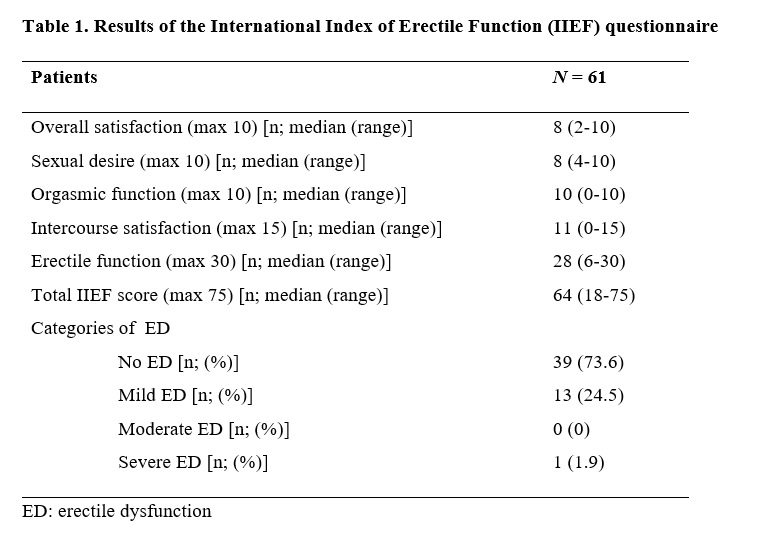P137 The prevalence and severity of sexual dysfunction in male IBD patients: an observational single-center study
Dal Buono, A.(1)*;Gabbiadini, R.(1);Alfarone, L.(1);Brunetti, A.(2);Solitano, V.(1);D'Amico, F.(3);Vena, W.(2);Pizzocaro, A.(2);Armuzzi, A.(1,4);
(1)Humanitas Research Hospital - IRCCS, IBD Center, Rozzano- Milan, Italy;(2)Humanitas Research Hospital - IRCCS, Endocrinology Unit, Rozzano- Milan, Italy;(3)Ospedale San Raffaele - IRCCS, Gastroenterology and Endoscopy, Milan, Italy;(4)Humanitas University, Department of Biomedical Sciences, Pieve Emanuele- Milan, Italy;
Background
Inflammatory bowel diseases (IBD), including Crohn’s disease (CD) and ulcerative colitis (UC), are lifelong disabling disorders with a significant impact on the quality of life. Previous studies reported sexual dysfunction (SD) could have a remarkable prevalence of about 25-45% in male IBD population, compared to 10-20% in the general population of the same age. However, this topic has not attracted widespread attention, and thus research studies are scarce. The aim of the study was to determine the rate and the severity of SD in a cohort of male IBD patients and to identify the associated risk factors.
Methods
This is an observational single-center study. From July 2021 to June 2022, IBD patients, who were attending scheduled visits, were invited to fill the International Index of Erectile Function (IIEF) questionnaire. Clinical data, including disease behaviour, treatment history and previous surgery, were collected. Both descriptive and inferential statistical analyses were carried out.
Results
A total of 61 male IBD patients, encompassing 33 with CD and 28 UC, were enrolled. Overall, the median age was 33.8 years (range, 19.7 – 63.7); the median body mass index (BMI) was 26.5 kg/m2 (range, 17.6 – 31.9). Almost half of the subjects were active or former smokers (49.1%). The great majority (81.9%) were receiving biological therapies, less than half had an history of IBD-related surgery (42.6%). The median total IIEF score was 64 (range, 18-75). Totally, 25.4% of the included patients reported having erectile dysfunction (ED), according to erectile function subscore. Univariate analysis showed age (p = 0.001), calprotectin levels (p<0.05) and biological therapy duration (p<0.05) as variables significantly associated with total IIEF score; age (p = 0.003) and calprotectin levels (p<0.05) were also significantly correlated with erectile function subscore. At multivariate level, age and calprotectin levels were confirmed to significantly influence both total IIEF score (p = 0.003 and p = 0.002, respectively) and erectile function subscore (p = 0.001 and p = 0.01, respectively).
Conclusion
Nearly a quarter of included IBD patients were found having ED, while rates of 5-15% in healthy subjects of the same age has been previously reported in literature. Based on our results, gastroenterologists should assess the sexual function of IBD patients and, when indicated, prompt referral for andrological investigation should be considered to improve their quality of life.


